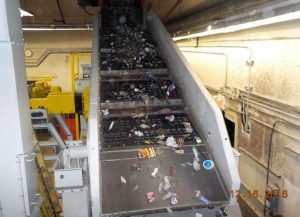 Pratt Industries sets a one-day recycled paper production record, and some Canadian grocery stores take aim at waste by eliminating packaging altogether.
Pratt Industries sets a one-day recycled paper production record, and some Canadian grocery stores take aim at waste by eliminating packaging altogether.

 Pratt Industries sets a one-day recycled paper production record, and some Canadian grocery stores take aim at waste by eliminating packaging altogether.
Pratt Industries sets a one-day recycled paper production record, and some Canadian grocery stores take aim at waste by eliminating packaging altogether.
 A Canadian city drives its curbside contamination rates down, and a U.S. city increases recycling tonnages by 20 percent.
A Canadian city drives its curbside contamination rates down, and a U.S. city increases recycling tonnages by 20 percent.
 Details emerge on a recycling collection contract negotiation process in Columbus, Ohio, and a study finds millennials would sacrifice social media for seven days to boost recycling.
Details emerge on a recycling collection contract negotiation process in Columbus, Ohio, and a study finds millennials would sacrifice social media for seven days to boost recycling.
 Small collection facilities that run their recyclables through compactors before shipping them to larger processing centers can realize considerable cost savings, a Canadian organization has shown.
Small collection facilities that run their recyclables through compactors before shipping them to larger processing centers can realize considerable cost savings, a Canadian organization has shown.
 A materials recovery facility spent $671,000 to buy and install glass cleanup equipment, which is generating $296,000 in annual savings. The project in Guelph, Ontario shows how investing in glass recovery technologies can pencil out favorably for MRFs.
A materials recovery facility spent $671,000 to buy and install glass cleanup equipment, which is generating $296,000 in annual savings. The project in Guelph, Ontario shows how investing in glass recovery technologies can pencil out favorably for MRFs.
A bill introduced in Ontario would implement full extended producer responsibility for paper and packaging products as the province pushes to increase diversion rates and combat climate change.
 Ontario lawmakers last week passed a bill mandating producers to pay the full costs of recycling printed paper and packaging. However, many specifics of the recovery system, which will target a wide range of plastic products, have yet to be determined.
Ontario lawmakers last week passed a bill mandating producers to pay the full costs of recycling printed paper and packaging. However, many specifics of the recovery system, which will target a wide range of plastic products, have yet to be determined.
 Brand owners will have to cut bigger checks over the next year to support curbside recycling in Canada’s most populous province.
Brand owners will have to cut bigger checks over the next year to support curbside recycling in Canada’s most populous province.
 In its first full year of operation, British Columbia’s printed paper and packaging recycling program notched a 77 percent recovery rate, beating the target set by the government.
In its first full year of operation, British Columbia’s printed paper and packaging recycling program notched a 77 percent recovery rate, beating the target set by the government.
 Climbing recycled paper prices contributed to the recent idling or closure of two newsprint mills, one in North America and one in Asia.
Climbing recycled paper prices contributed to the recent idling or closure of two newsprint mills, one in North America and one in Asia.
